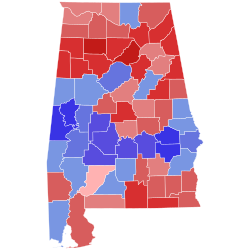
Back Außerordentliche Wahl zum Senat der Vereinigten Staaten in Alabama 2017 German Elesiòṅ speciàli in Alabàma dal 2017 p'r al Senàt di Stat Unî EML Elección especial al Senado de los Estados Unidos en Alabama de 2017 Spanish Élection sénatoriale américaine spéciale de 2017 en Alabama French Pemilihan umum istimewa Senat Amerika Serikat di Alabama 2017 ID Дополнительные выборы в Сенат США (Алабама, 2017) Russian
| |||||||||||||||||
| Turnout | 40.5%[1] | ||||||||||||||||
|---|---|---|---|---|---|---|---|---|---|---|---|---|---|---|---|---|---|
| |||||||||||||||||
Jones: 40–50% 50–60% 60–70% 70–80% 80–90% >90% Moore: 40–50% 50–60% 60–70% 70–80% 80–90% >90% Tie: 40–50% 50% No data | |||||||||||||||||
| |||||||||||||||||
| Elections in Alabama |
|---|
 |
|
|
The 2017 United States Senate special election in Alabama took place on December 12, 2017, in order for the winner to serve the remainder of the U.S. Senate term ending on January 3, 2021. A vacancy arose from Senator Jeff Sessions's February 8, 2017, resignation from the Senate. Sessions resigned his post to serve as the 84th U.S. attorney general. On February 9, 2017, Governor Robert J. Bentley appointed Luther Strange, the attorney general of Alabama, to fill the vacancy until a special election could take place. The special election was scheduled for December 12, 2017.[2]
Doug Jones, a former U.S. attorney for the Northern District of Alabama, won the Democratic primary election. Roy Moore, a former chief justice of the Supreme Court of Alabama, competed with Strange and U.S. Representative Mo Brooks in the August 15, 2017, Republican primary; the two highest vote-getters, Moore and Strange, advanced to a runoff.[3] President Donald Trump supported Strange during the primary runoff, as did much of the Republican establishment in the Senate.[4][5] Moore won the primary runoff on September 26, 2017.[6][7]
Following the primaries, Moore was expected to easily win the general election. Polling showed him with a clear lead, and Alabama is known for its overwhelming support for Republicans. The race was upended in mid-November 2017, when multiple women alleged that Moore had made unwanted advances or sexually assaulted them when he was in his early thirties and they were in their teens (the youngest was 14 at the time), attracting widespread national media coverage of the election.[8][9] As a result of these allegations, many national Republican leaders and office holders called for Moore to withdraw from the special election, rescinded their endorsements of him, and stopped funding his campaign.[10][11][12] Trump and many Alabama Republicans reaffirmed their support.[13] At the time of the revelations, it was too late to remove his name from the ballot.
On December 12, 2017, the Associated Press called the election for Jones; however, Moore refused to concede.[14][15] Jones’ victory was widely labeled a major upset. He was sworn into office on January 3, 2018, becoming the first Democratic U.S. senator from Alabama since Howell Heflin left office in 1997.[16] This is the only time Democrats won a statewide election in Alabama since 2008, when Lucy Baxley was elected President of the Alabama Public Service Commission.
- ^ "Unofficial Election Night Result". Alabama Secretary of State. Retrieved December 25, 2017.
- ^ "Governor Ivey Moves US Senate Special Election to Adhere with State Law" (Press release). Office of the Governor of Alabama. April 18, 2017. Retrieved April 18, 2017.
- ^ Bloch, Matthew; Lee, Jasmine (August 15, 2017). "Alabama Election Results: Two Republicans Advance, Democrat Wins in U.S. Senate Primaries". The New York Times. Retrieved August 15, 2017.
- ^ Ball, Molly. "The Alabama Senate Race Gets Moore Strange", The Atlantic (August 16, 2017).
- ^ "Sexual misconduct accusations transform Alabama Senate race", Associated Press via ABC News (November 10, 2017): "Virtually the entire Republican establishment — including President Donald Trump — opposed Moore's primary bid in September."
- ^ Cite error: The named reference
Schererwas invoked but never defined (see the help page). - ^ Strauss, Daniel. "Moore crushes Strange in Alabama Senate primary", Politico (September 26, 2017).
- ^ Cite error: The named reference
allegationswas invoked but never defined (see the help page). - ^ Cite error: The named reference
Tillettwas invoked but never defined (see the help page). - ^ Isenstadt, Alex; Debenedetti, Gabriel (November 10, 2017). "Moore defiant as Senate Republicans sever ties". Politico. Retrieved November 11, 2017.
- ^ Sullivan, Sean (November 14, 2017). "Paul Ryan joins GOP calls for Roy Moore to end campaign amid sexual misconduct allegations". The Washington Post. Retrieved November 14, 2017.
- ^ Sullivan, Sean; Viebeck, Elise (November 13, 2017). "McConnell calls on Roy Moore to end Senate campaign following accusations of sexual misconduct". The Washington Post. Retrieved November 13, 2017.
- ^ Berenson, Tessa (November 10, 2017). "All the Ways Alabama Republicans Are Defending Roy Moore". Time. Retrieved November 10, 2017.
- ^ Chandler, Kim; Peoples, Steve (December 12, 2017). "Jones wins in stunning Alabama upset". Associated Press. Retrieved December 12, 2017.
- ^ Sullivan, Sean; Weigel, David; Fahrenthold, David A. (December 12, 2017). "Doug Jones declared victor in Alabama race for Senate; Roy Moore may seek recount". The Washington Post. ISSN 0190-8286. Retrieved December 13, 2017.
- ^ "Doug Jones swearing-in: Watch live as Senate seats new Alabama member". Al.com. Retrieved January 4, 2018.
Cite error: There are <ref group=lower-alpha> tags or {{efn}} templates on this page, but the references will not show without a {{reflist|group=lower-alpha}} template or {{notelist}} template (see the help page).
© MMXXIII Rich X Search. We shall prevail. All rights reserved. Rich X Search




